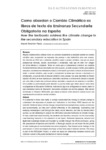Mostrar o rexistro simple do ítem
Como abordan o cambio climático os libros de texto da Ensinanza Secundaria Obligatoria na España
| dc.contributor.author | Serantes-Pazos, Araceli | |
| dc.date.accessioned | 2019-03-13T08:35:07Z | |
| dc.date.available | 2019-03-13T08:35:07Z | |
| dc.date.issued | 2015 | |
| dc.identifier.citation | Ambientalmente Sustentable, 2015, 20: 249-262. ISSN: 1887-2417 | es_ES |
| dc.identifier.issn | 1887-2417 | |
| dc.identifier.uri | http://hdl.handle.net/2183/22200 | |
| dc.description.abstract | [Resumo] Resulta imprescindible coñecer como se constrúe socialmente a realidade arredor do cambio climático para comprender as respostas das persoas e das institucións ante esta ameaza. Os informes do IPCC son o referente científico sobre o cambio climático, nos que se aúnan perspectivas técnicas, sociais, económicas e ambientais, máis que de feito non chegan de forma efectiva á cidadanía. Tendo en conta que o coñecemento cotidiano se constrúe fundamentalmente a través dos medios de comunicación, as redes sociais e, tamén, polo sistema educativo, consideramos interesante analizar a información que están a ofrecer os libros de texto sobre o cambio climático, para axudar a comprender as ideas que manexa o alumnado e o profesorado, xa que se trata do recurso didáctico máis utilizado nas aulas escolares no Estado español. Os libros de texto reproducen, transmiten e lexitiman o coñecemento elexido e imposto por unha élite a través dos currículos oficias, dandolles a apariencia de obxectivo e científico. Unha análise en profundidade pode desvelar os puntos febles que deben asumir como retos os programas de Educación Ambiental. Adiantamos algunhas achéguedas do estudo piloto no que analizamos textos de Educación Secundaria utilizados nos centros galegos. Este estudo enmárcase no Proxecto RESCLIMA, que estuda a relación entre ciencia e cultura común nas representacións sociais do cambio climático. | es_ES |
| dc.description.abstract | [Abstract] It is essential to know how reality is socially constructed the concep of climate change to understand the responses of people and institutions to this threat. PICC reports are the scientifc reference about climate change, inclued technical perspectives, socials, economics and environmental, but they don’t arrived efectively at the citizenship. Considering that everyday knowledge is built through the media, social networks, and also by the education system, we are interesting to analyze the information provided textbooks on climate change, to help understand ideas handling the students and teachers, because it is the most widely used teaching resource in the classroom in the Spain. Textbooks reproduce, transmit and legitimize knowledge chosen and imposed by an elite through the ofcial curriculum, giving the appearance of objective and scientifc. A thorough analysis we can reveal the dim points to take challenges as environmental education programs. Fast forward some fndings of the pilot estudo in which we analyze secondary school texts used in Galician centers. This study is part of the RESCLIMA Project, in which we study the relationship between science and common culture in the public perception of climate change. | es_ES |
| dc.language.iso | glg | es_ES |
| dc.publisher | Universidade da Coruña, Servizo de Publicacións | es_ES |
| dc.rights | Atribución-CompartirIgual 3.0 España | es_ES |
| dc.rights.uri | http://creativecommons.org/licenses/by-sa/3.0/es/ | * |
| dc.subject | Cambio climático | es_ES |
| dc.subject | Libros de texto | es_ES |
| dc.subject | Educación secundaria | es_ES |
| dc.subject | Educación ambiental | es_ES |
| dc.subject | Representacións sociais | es_ES |
| dc.subject | Climate change | es_ES |
| dc.subject | Textbooks | es_ES |
| dc.subject | Secondary education | es_ES |
| dc.subject | Environmental education | es_ES |
| dc.subject | Social representations | es_ES |
| dc.title | Como abordan o cambio climático os libros de texto da Ensinanza Secundaria Obligatoria na España | es_ES |
| dc.type | info:eu-repo/semantics/article | es_ES |
| dc.rights.access | info:eu-repo/semantics/openAccess | es_ES |
| UDC.journalTitle | AmbientalMente Sustentable: Revista científica galego-lusófona de educación ambiental | es_ES |
| UDC.volume | 20 | es_ES |
| UDC.startPage | 249 | es_ES |
| UDC.endPage | 262 | es_ES |
| dc.identifier.doi | https://doi.org/10.17979/ams.2015.02.020.1603 |






